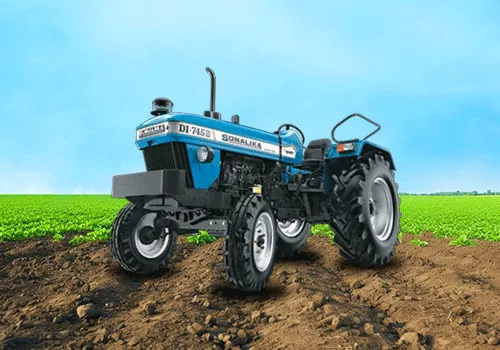
Sustainable agriculture has become a topical subject that is increasingly recognised as a global issue. It is a pressing necessity. In response to rising climate change and environmental degradation concerns, the agricultural sector faces growing pressure to limit its carbon footprint. A huge percentage of farm emissions are from machinery, including the ubiquitous tractor. Once almost all-diesel, these machines are now at the heart of a growing argument: can biofuel and electric tractors offer viable, green alternatives?
Diesel Tractors and Their Environmental Impact
Conventional tractors mostly operate on diesel, which is a fossil fuel with extremely high emissions of GHGs — carbon dioxide (CO2), nitrogen oxides (NOx) and particulate matter. These emissions contribute to climate change, but also worsen local air quality, posing threats to the health of rural communities. Because tractors are widely used in all fields of agriculture, any move toward greener alternatives will have a major impact on the environment.
Biofuel Tractors – A Bright Step Towards Sustainability
Biodiesel and ethanol are biofuels derived from renewable biological materials, including plant oils, crop waste, and animal fats. Biodiesel, again, is considered a viable replacement for diesel in traditional tractor engines.
Pros:
Compatibility: Most current diesel tractors can operate on biodiesel blends without needing extensive engine changes.
Reduced Emissions — Biodiesel produces far less CO2 and particulate matter than fossil diesel.
Local Economic Benefits: Biofuels are generally produced from crops grown locally, which benefits the agricultural sector in the region and lowers reliance on imported fuel.
Cons:
Feedstock Challenges: Scaling up biofuels requires massive amounts of crops, leading to land-use and food security issues.
Biogasoline contributes to toxic air pollutants that can cause respiratory diseases.
Limited Emissions Savings: Even though they are cleaner than diesel, biofuels still produce GHGs during the process of production and combustion.
Still, biofuel tractors are a stopgap for farmers not ready to make the jump to full electrification but looking for a greener alternative to diesel.
Electric Tractors and The Future of Farming?
Electric tractors work on a similar principle but are powered by rechargeable batteries, which are an exciting and cleaner alternative to their gasoline counterparts. Top manufacturers and startups are racing to build fully electric tractors that rival their diesel contemporaries in muscle and longevity.
Pros:
No Exhaust Emissions: Electric tractors do not emit emissions during operation, making them suitable for sensitive locations.
Reduced Operating Costs: Electric motors are cheaper to run than diesel, and also require less upkeep due to fewer moving parts.
India: Opera – Honey and the Well Balanced Environmental-Friendly: With no gas emissions, it makes it an eco-friendly machine.
Cons:
Battery Limitations: Nowadays, battery pack technology limits operating time — this is especially true for large-scale farming operations.
Initial High Cost: Due to less flexibility in varieties, electric tractors can be more expensive to purchase, but over time, they can provide savings.
Charging Infrastructure: Several rural regions also don’t have adequate infrastructure for energy-efficient battery charging.
All these make the electric tractor market gather momentum. With models like the Monarch Electric Tractor and the Solectrac eUtility Tractor leading the charge, farmers are getting a taste of a cleaner, quieter future.
Please note that you are comparing the costs and efficiency
Cost is also a key consideration for any farmer. Electric tractors might be more expensive to purchase, but they generally have lower fuel and maintenance costs. Biofuel tractors are in the middle — often cheaper to switch to than electric, but integrating better with existing machinery and still relying on a fuel supply chain.
By this measure, it is not efficient for all tasks. Electric tractors excel in confined spaces, such as a vineyard or the parking lot of an urban farm. Biofuel-powered tractors also fit better in larger areas, where longer operating times are needed.
Incentive By the Government and Support
Green tractors are becoming more part of the transitional process with subsidies, grants, and tax breaks. In the United States, Canada, and Germany, for example, farmers can get subsidies for the purchase of electric or biofuel-compatible equipment. These programs are important in helping to offset high upfront costs and making green alternatives more affordable.
Challenges to Mass Adoption
Although promising, the path to widespread adoption of biofuel and electric tractors is not without any barriers. Key barriers include infrastructure, cost, and technological maturity. In addition, farmer awareness and willingness to alter established practices can influence how quickly the transition occurs.
But the momentum is undeniable, with governments, manufacturers, and environmental organizations pushing for greener practices. As innovation and investment continue toward this goal, it is possible that someday we may see green tractors on farmlands across the globe.
Conclusion
The question isn’t whether biofuel and electric tractors will be viable — it’s how quickly they can become the norm. Biofuels are a pragmatic transitional path toward sustainability, and electric tractors have the potential to fundamentally change agriculture over the long term. For farmers, the switch to green alternatives isn’t merely reducing emissions — it’s an investment in the future of agriculture.
As technology improves and the support systems expand, the green tractor revolution is not only feasible but also unavoidable. It’s a shift in response to necessity, but fueled by innovation and a shared desire to foster a cleaner, more sustainable planet.


